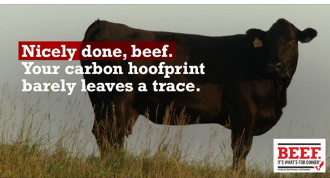Beef Production Is Not Sustainable

There is nothing sustainable whatsoever about beef production. We’re losing 3769 square miles of the Amazon rain forest per year, a figure that’s accelerating due to the election of Jair Bolsonaro in Brazil. Between 15 and 17 percent of the Amazon rainforest has been lost, and if the amount of cleared forest land reaches 25 percent, there won’t be enough trees cycling moisture through the rainforest. That will cause the rainforest to dry out and degrade into a savanna.
McDonald’s alone slaughters 47 cows every minute of every day.
The world’s population will grow by 1.9 billion in the next 30 years, and, sadly, the planet’s appetite for meat per capita is actually growing.
That beef production practices are worse elsewhere in the world is meaningless.

I have been saying for years that there is a strong case for reducing our collective meat intake, ideally to an amount which can be delivered sustainably from grazing areas where grazing is the most suitable activity, and by using secondary plant materials as fodder e.g wheet straw, and maize stalks. When food grade grain and other crips are specifically produced as animal fodder on large amounts of land, in my view this is not sustainable.
I believe some nations are looking at establishing a meat tax to recognise the generally higher environmental impacts of meat versus plant based foods, and would be interested to know the thoughts of readers on this matter. I believe figures around $1 per kg for beef and less for chicken and pork were under consideration.
I’ve not heard anything about that. Sounds like a reasonable idea.